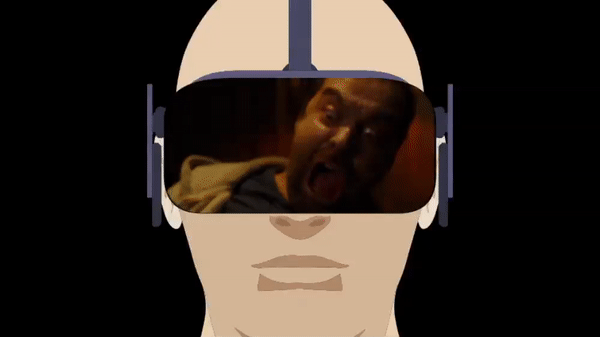Brands are experimenting to discover the right pieces to the virtual reality puzzle and figure out how the visceral vertical can provide viable non-linear value in their marketing pipelines.
One of the leaders of this movement is the world of cinema professionals, who are working toward creating premium tie-in experiences for big-budget movies.
Movie megalith Lionsgate, along with Unity, the world’s largest VR development company, might have formed their own tangram by way of “Virtual Room,” an interactive VR advertisement and storytelling format for the forthcoming film Jigsaw.
The immersive ad format and short-form experience gives players and horror buffs the ability to interact with objects as they learn more about the new film and decide how they save themselves from impending doom and gloom. The film is set to hit theaters on October 27. The VR feature is seemingly a perfect fit for the eighth and latest installment in the Saw horror franchise, which involves escape-room horror.
“We’re always looking for new and innovative ways of shining a spotlight on our upcoming film releases and engaging the passionate fans who seek them out,” David Edwards, senior vice president of digital marketing at Lionsgate, told AListDaily. “The rich film vocabulary that the Saw franchise has amassed throughout its storied history, and the new directions taken in this October’s Jigsaw—to embrace and evolve those iconic story elements—are an ideal fit for the VR medium. . . . With this immersive ad opportunity specifically, and through our Jigsaw marketing campaign in total, we’re incredibly excited for the chance to frighten, delight and intrigue horror fans, steadily preparing them in the months and weeks to come for a new vision of Saw.”
Virtual Room is part of a pilot program designed to showcase Unity’s capabilities in bringing engaging VR ads to the forefront.

“Unity is enabling advertising in two ways through the Virtual Room program—by using our engine to make the advertiser creative, and using our network of content developers and apps to distribute that experience,” Agatha Bochenek, head of mobile and VR and AR advertising at Unity Technologies, told AListDaily. “The Virtual Room ad format will be a sandbox environment for brands to build their stories with high-quality content, and will include objects and interactions that reflect the brand and ultimately drive positive awareness and engagement.”
Bochenek believes Virtual Room is equivalent to the 30-second ad spot of VR and will become an integrated part of the moviemaking process in the future, expecting it to stretch across a diverse portfolio where a user can either be immersed in a children’s movie while being surrounded by a cartoon-like world, or a film where they’re thrown straight into an action sequence.
The challenge of developing such VR advertising will be to use it respectfully so that doesn’t overwhelm users, Bochenek says. “It will be a fascinating evolution to see, and I’m excited about it from a consumer perspective as well.”
The partnership with Lionsgate to create such experiences also open new avenues for Unity developers to monetize content, which till now has been limited to micro transactions and in-app purchases.
“Our secret sauce is putting development tools and technologies into the hands of the world’s greatest storytellers—the brands themselves,” Bochenek says. “Whether it’s fear, thrill, amusement, love, awe, or simply escapism, the immersive storytelling format of a movie is incredibly powerful. And movie ads or trailers are meant to evoke similar feelings in a shorter form. When you compare a flat screen to being within a VR experience, people can feel so much more. It can create a stronger emotional connection, and be a very powerful way of engaging a user to convey a key message, encouraging more people to want to see the film.”
The interactive experience is created within the Interactive Advertising Bureau’s (IAB) emerging ad experience guidelines.
“In a new space, it’s common to experiment and approach things differently. And while innovation is crucial to the success of a new medium, the many options can be daunting,” Bochenek says. “The IAB, and the members of the VR committee, including Unity, want to ensure the ad experience is scaleable and assure successful parameters to meet advertiser ROI. The best way to do that is to create standards that allow for creativity without the potential failure of an unproven idea.”
Lionsgate has long embraced VR and AR from a marketing perspective. They have launched promotional VR efforts for past film releases, often alongside major technology partners like Samsung and Qualcomm, ranging from games to complex and fully interactive room-scale experiences to simpler, behind-the-scenes 360-degree and 3D video features.
“Cinemagoers have always wanted to enter into the worlds of their favorite films,” Edwards says. “VR allows for exactly that.”

